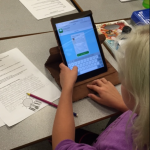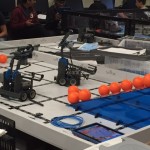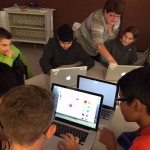 This past week I had the opportunity to visit both Surrey and West Vancouver school districts as we explored innovative learning environments and Fresh Grade ~ an electronic portfolio with numerous possibilities for supporting formative assessment practices. Our tour included various schools and both school district offices where system leaders proudly shared their current journey, their successes and their challenges with implementation, monitoring and scalability.
This past week I had the opportunity to visit both Surrey and West Vancouver school districts as we explored innovative learning environments and Fresh Grade ~ an electronic portfolio with numerous possibilities for supporting formative assessment practices. Our tour included various schools and both school district offices where system leaders proudly shared their current journey, their successes and their challenges with implementation, monitoring and scalability.
As we toured Fraser Heights Secondary school, we were extremely impressed with the robotics, the newly designed Learning Commons with 3-D printers, sound and editing equipment and Green Screen, the science department with classrooms surrounding a high-tech lab and various contemporary networking spaces throughout the school. The absence of bells, the continuous feeds on the numerous LCD panels and the inspirational posters and messages throughout the building exuded “learning” at its finest. The teachers who greeted us spoke passionately about the power of using Fresh Grade as a tool to support formative assessment, their students’ commitment to constant improvement and the power of working in teams.
Our visit to Cambridge Elementary school also included new technology, contemporary learning spaces, inspirational posters, articulate students who comfortably showed us the Fresh Grade application but more importantly the power of a strong, dedicated admin team. I was impressed with Kelli’s (the VP) conscious decision to be a teaching administrator. In her own words ~ she can have the greatest impact on teacher practice by working alongside of her staff. Her principal partner knew the ins and outs of supporting technology, embracing the parent community and building team.
Although I have no doubt that these schools were selected for their contemporary design, strong leadership teams and leading edge technology there were definite take-aways that could be employed in any school. The Fresh Grade platform is a well-designed tool for students and teachers to use for those important discussions about formative assessment. In using the tool, teachers need to know what to document and what questions the documentation raises about improved student learning ~ which ultimately leads to reflection of teacher practice.
 However, the power of this e-portfolio application is not contingent on a new building or flashy technological gadgets. But it does require educators who want to go deeper than just marking summative tasks and providing letter grades or numeric values. It requires the conditions within a school community where parents are involved and invited to comment on evidence of student learning throughout the school year, not just a designated reporting times. It requires rich discussions about the difference between work that looks good and work that speaks to a student’s learning journey. It requires a school staff who is willing to engage in learning discussions about what it will take to move student learning forward ~ which ultimately leads to a change in practice. And it requires a leadership team who knows how to support the education of parents in regards to this contemporary assessment format, how to support educators as they weave electronic documentation into their daily routines and how to support students as they select evidence of learning and contribute their reflections.
However, the power of this e-portfolio application is not contingent on a new building or flashy technological gadgets. But it does require educators who want to go deeper than just marking summative tasks and providing letter grades or numeric values. It requires the conditions within a school community where parents are involved and invited to comment on evidence of student learning throughout the school year, not just a designated reporting times. It requires rich discussions about the difference between work that looks good and work that speaks to a student’s learning journey. It requires a school staff who is willing to engage in learning discussions about what it will take to move student learning forward ~ which ultimately leads to a change in practice. And it requires a leadership team who knows how to support the education of parents in regards to this contemporary assessment format, how to support educators as they weave electronic documentation into their daily routines and how to support students as they select evidence of learning and contribute their reflections.
Have you used an electronic portfolio to document student learning? If so, how has it impacted your practice?
Come write with me….

Sounds like an amazing trip. I would love to learn more about this application and agree with Rose that providing feedback to students and parents in a more timely fashion can only serve to boost connection and encourage home participation. I have heard of teachers using Instagram to do similar things with communication.
I loved hearing about your travels and all the new learning. I wonder if the power of formative assessment is in the timely delivery and reflection of educators with children and their families. If families are given feedback in a timely, consistent manner that allows their voice to be heard then would families feel invested and engaged in the learning process? I also wonder if this form of formative assessment might be of greater value to the child and family as a support system rather than waiting for a summative every three months. Would it be possible for the child to record their learning journey/process and then share this with their families as a way of cultivating a supportive network? Could this in class formative self assessment be richer than homework, tests and later date summative?